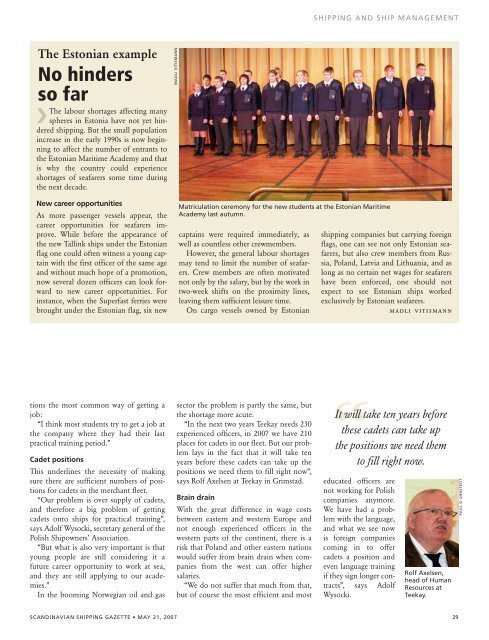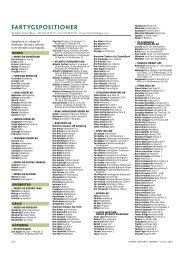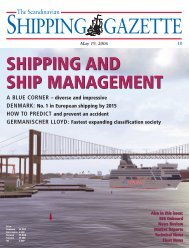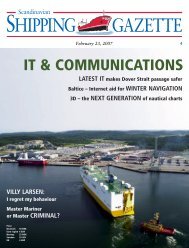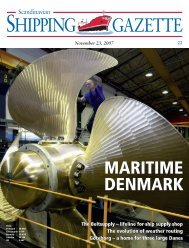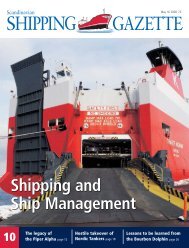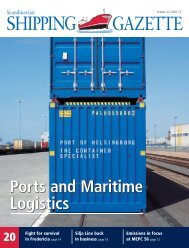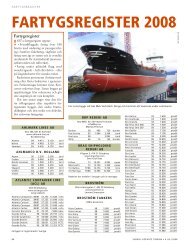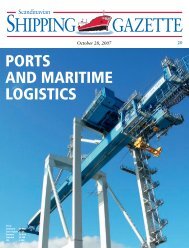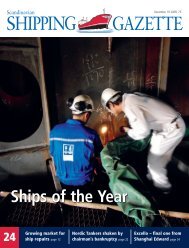SSG No 10 - Shipgaz
SSG No 10 - Shipgaz
SSG No 10 - Shipgaz
Create successful ePaper yourself
Turn your PDF publications into a flip-book with our unique Google optimized e-Paper software.
The Estonian example<br />
<strong>No</strong> hinders<br />
so far<br />
❯<br />
The labour shortages affecting many<br />
spheres in Estonia have not yet hindered<br />
shipping. But the small population<br />
increase in the early 1990s is now beginning<br />
to affect the number of entrants to<br />
the Estonian Maritime Academy and that<br />
is why the country could experience<br />
shortages of seafarers some time during<br />
the next decade.<br />
New career opportunities<br />
As more passenger vessels appear, the<br />
career opportunities for seafarers improve.<br />
While before the appearance of<br />
the new Tallink ships under the Estonian<br />
flag one could often witness a young captain<br />
with the first officer of the same age<br />
and without much hope of a promotion,<br />
now several dozen officers can look forward<br />
to new career opportunities. For<br />
instance, when the Superfast ferries were<br />
brought under the Estonian flag, six new<br />
tions the most common way of getting a<br />
job:<br />
“I think most students try to get a job at<br />
the company where they had their last<br />
practical training period.”<br />
Cadet positions<br />
This underlines the necessity of making<br />
sure there are sufficient numbers of positions<br />
for cadets in the merchant fleet.<br />
“Our problem is over supply of cadets,<br />
and therefore a big problem of getting<br />
cadets onto ships for practical training”,<br />
says Adolf Wysocki, secretary general of the<br />
Polish Shipowners’ Association.<br />
“But what is also very important is that<br />
young people are still considering it a<br />
future career opportunity to work at sea,<br />
and they are still applying to our academies.”<br />
In the booming <strong>No</strong>rwegian oil and gas<br />
MADLI VITISMANN<br />
sector the problem is partly the same, but<br />
the shortage more acute.<br />
“In the next two years Teekay needs 230<br />
experienced officers, in 2007 we have 2<strong>10</strong><br />
places for cadets in our fleet. But our problem<br />
lays in the fact that it will take ten<br />
years before these cadets can take up the<br />
positions we need them to fill right now”,<br />
says Rolf Axelsen at Teekay in Grimstad.<br />
Brain drain<br />
With the great difference in wage costs<br />
between eastern and western Europe and<br />
not enough experienced officers in the<br />
western parts of the continent, there is a<br />
risk that Poland and other eastern nations<br />
would suffer from brain drain when companies<br />
from the west can offer higher<br />
salaries.<br />
“We do not suffer that much from that,<br />
but of course the most efficient and most<br />
SHIPPING AND SHIP MANAGEMENT<br />
Matriculation ceremony for the new students at the Estonian Maritime<br />
Academy last autumn.<br />
captains were required immediately, as<br />
well as countless other crewmembers.<br />
However, the general labour shortages<br />
may tend to limit the number of seafarers.<br />
Crew members are often motivated<br />
not only by the salary, but by the work in<br />
two-week shifts on the proximity lines,<br />
leaving them sufficient leisure time.<br />
On cargo vessels owned by Estonian<br />
shipping companies but carrying foreign<br />
flags, one can see not only Estonian seafarers,<br />
but also crew members from Russia,<br />
Poland, Latvia and Lithuania, and as<br />
long as no certain net wages for seafarers<br />
have been enforced, one should not<br />
expect to see Estonian ships worked<br />
exclusively by Estonian seafarers.<br />
madli vitismann<br />
It will take ten years before<br />
these cadets can take up<br />
the positions we need them<br />
to fill right now.<br />
educated officers are<br />
not working for Polish<br />
companies anymore.<br />
We have had a problem<br />
with the language,<br />
and what we see now<br />
is foreign companies<br />
coming in to offer<br />
cadets a position and<br />
even language training<br />
if they sign longer contracts”,<br />
says Adolf<br />
Wysocki.<br />
Rolf Axelsen,<br />
head of Human<br />
Resources at<br />
Teekay.<br />
SCANDINAVIAN SHIPPING GAZETTE • MAY 21, 2007 29<br />
PAUL G UNNSTEDT


